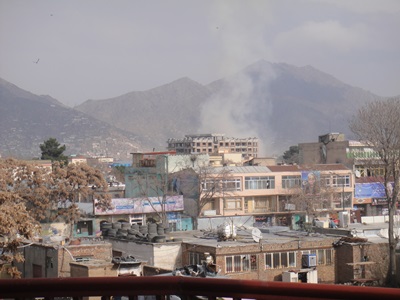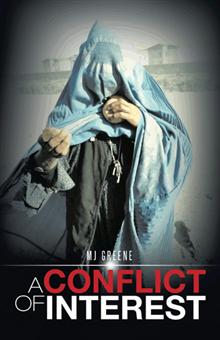
AFP PODCAST —
A new book by a civilian contractor, the first of its kind written by someone intimately involved with Afghanistan’s so-called reconstruction effort, makes clear that the near-prehistoric country has made no progress in improving the impoverished region or erasing the violence that has plagued this land for millennia.
MJ Greene, the author of A Conflict of Interest, provides a first-hand account of living and working in Afghanistan, as “a fair-skinned, blue-eyed, blonde Australian” who worked as a general manager for a the largest NATO subcontractor there from 2007 to 2010.
Dave Gahary sat down with Ms. Greene to discuss her book in this revealing interview (19:19).
Dave Gahary, a former submariner in the U.S. Navy, is the host of AFP’s ‘Underground Interview’ series.
Be sure to check out all of AFP’s free podcasts. You’ll find them on the HOME PAGE, ARCHIVES & PODCAST section.
Afghanistan Civilian Contractor Whistleblower Exposes Corruption, Failed NWO Plan
• Australian’s book reveals impossible task for U.S., NATO in Islamic Republic of Afghanistan
By Dave Gahary
Despite the trillions of dollars wasted and hundreds of thousands of lives lost on the United States and North Atlantic Treaty Organization (NATO)-led war in Afghanistan since October 7, 2001, the New World Order (NWO) is no closer to bringing stability to that country than state and local law enforcement is to containing the violence in Camden, New Jersey. In fact, the stated enemy of the NWO, the Taliban, is much stronger than it was since the illegal invasion began nearly 13 years ago.
A new book by a civilian contractor, the first of its kind written by someone intimately involved with Afghanistan’s so-called reconstruction effort, makes clear that the near-prehistoric country has made no progress in improving the impoverished region or erasing the violence that has plagued this land for millennia.
With the Afghan presidential election only a few weeks away on April 5, 2014, and the Taliban vowing to disrupt the electoral process, the February 25, 2014 announcement by President Barack Hussein Obama ordering the Pentagon “to make plans for a full pullout of American troops from Afghanistan by the end of the year,” the NWO’s failures may become even more apparent.
MJ Greene, the author of A Conflict of Interest, provides a first-hand account of living and working in Afghanistan, as “a fair-skinned, blue-eyed, blonde Australian” who worked as a general manager for a the largest NATO subcontractor there from 2007 to 2010.
Ms. Greene, which is not her real name, exposed corruption in the company she worked for when she discovered they were bootlegging—essentially dealing in contraband by supplying alcohol, which is illegal in the Muslim country, to members of the 26 coalition nations that “were stationed all throughout Afghanistan,” as well as to local Afghans. Besides the illegal alcohol business, the company she worked for, which is not revealed in her book, has been targeted by the Pentagon for overbilling, or as some would refer to it, war racketeering.
Ms. Greene recently sat down with AMERICAN FREE PRESS to discuss her book and to explain why she volunteered to go to Afghanistan in 2007 when she was 37 years old. Ms. Greene revealed the name of the company to this newspaper, but AFP has agreed not to disclose it out of concern for Ms. Greene’s safety.
“My father was ex-special forces, a Vietnam vet,” she said. “I spent a lot of time in my life living and working in parts of the UK, in Europe, and when this opportunity arose, I really felt that I had something good to offer, something whereby I could contribute and help to piece Afghanistan back together.”
According to Ms. Greene, the multinational she worked for “offers full-service supply-chain solutions worldwide. These solutions are usually described as ‘end to end’ and/or ‘turnkey,’ and they range the gamut: fuel/food supply, procurement, transportation, storage, technology, site services and so on.”
The company is a behemoth. A company official testified before the House Oversight Subcommittee on National Security last April, saying, “Food, fuel and other supplies are delivered to U.S. troops at more than 250 locations in Afghanistan by airplanes, helicopters and trucks.” Basically, civilian contractors are now handling what the military has done for decades.
The company’s illegal alcohol business was referred to as ‘export.’
“Export was a euphemism for selling alcohol on the black market,” Ms. Greene explained. “Export was alcohol that was not legally housed in Afghanistan, and, as you can imagine, that has huge ramifications, not only on the war effort, but it’s a little bit like putting an additional weapon in the hands of the Taliban. Because alcohol is forbidden in a Muslim country, and you could imagine how the Taliban would feel about alcohol being sold to the Afghan people.”
As she detailed in her book, “with the exception of fuel, alcohol was the most sought-after product on the black market,” and that “it was so lucrative that it would often boost sales by 50%.”
“In my business unit, I was responsible for all retail operations on the ground in Afghanistan,” she said. “We supplied all sorts of other products, but alcohol was the most sought after. Sometimes we couldn’t keep up with the demand.”
Ms. Greene explained alcohol’s appeal.
“When you’re in a conflict zone, when you’re living and working in an environment such as Afghanistan, where there’s a tremendous amount of pressure, you’re seeing things that most people don’t see in normal everyday society. There are a lot of bombings that are carried out, suicide bombings. There are a lot of insurgent attacks. So people turn toward some kind of vice, some kind of escapism. So you could imagine, alcohol was highly sought after as a way to sort of relax, unwind and let loose.”
How much the civilian contractors in Afghanistan, numbering over 100,000, depend on alcohol to get by, reveals a lot about the difficulty of making any substantive progress at all in that country, and provides additional evidence that the NWO’s strategy there is failing.
Ms. Greene’s hectic schedule as a general manger revealed the undeveloped state of Afghanistan, unlikely to ever improve, even after the pouring of trillions of taxpayer dollars into the sands of its deserts.
“There’s a lot of flying in and out, particularly when you’re looking at traveling from a place such as Kabul into a remote location such as Kandahar or one of the FOBs, the forward operating bases, because, a lot of these places in remote locations of Afghanistan, you can’t get to by car. So you’ve got no choice. You either get there on a fixed-wing, an airplane, or by helicopter.”
The types of people attracted to working in a war zone is also quite revealing as it relates to the NWO’s impending failure in Afghanistan.
“A lot of people that I worked with were attracted to working in Afghanistan because of the financial incentives associated,” she explained. “They couldn’t get a job back in their own country that would pay enough money to support their families. A lot of my team came from the Philippines, Nepal, and India, where they couldn’t get a job. They had mouths to feed, they had families to support, and they had children to educate. They risked their lives to live and work in a war zone to give their family a better life. A lot of my peers that were working in the same company, they were there for the same reasons.”
These Filipinos, Indians, Nepalese and Zimbabweans were referred to as TCNs, third country nationals, and many of them “eventually crumbled under the pressures of being in theater in the long term,” and “after they completed the 12 months agreed to in their employment contracts, they often never returned.”
A Conflict of Interest, although a nonfiction book, reads like a fiction thriller novel.
“I think what’s really important about my book is that it gives you an on-the-ground insight into what is actually going on in Afghanistan,” she said. “Unfortunately, as is the case in most conflict situations, we only see what we see or hear on the news. We don’t actually understand what it’s like to live and work on a daily basis in a place such as Afghanistan. I wanted people to have a better understanding that truth is never on the surface. You really have to dig down deep in order to find it.”
Ms. Greene is working on a sequel, titled An Eye for an Eye.

3/29/2014 PHOTO OF BOMB BLAST TAKEN BY AUTHOR OF ATTACK ON U.S. CHARITY ROOTS OF PEACE.
TARGET WAS ADJACENT CHRISTIAN CHURCH, BUT SUICIDE BOMBERS GOT THE WRONG ADDRESS.
THE BOMBERS THOUGHT A SERVICE WAS TAKING PLACE IN THE CHURCH.
ONE CHILD AND A DRIVER WERE KILLED AND FIVE INJURED.
Amount of Money Wasted on Afghan War is Mind Boggling
By Richard Walker
When pundits talk about the cost of the war in Afghanistan they neglect to mention the sheer scale of the waste of taxpayer dollars in the form of “aid.” Like Iraq before it, Afghanistan has swallowed tens of billions of dollars spent in a failed drug policy and for reconstruction that in some cases led to buildings erected in the wrong locations and money never reaching projects it was earmarked for.
Take the British. They recently discovered that approximately $3 billion sent to Afghanistan for the past five years to persuade farmers not to grow opium achieved nothing. In fact, opium production is booming, reaching record levels in 2013, with the situation now described as dire.
And, if that was not depressing enough, the Afghan authorities have admitted over $7 billion was spent on the drug war in the past 12 years—but they need even more funding.
While that is only the tip of the iceberg of wasteful spending, it is nevertheless significant.
On January 16, Senator Dianne Feinstein (D-Calif.), chairman of the Senate Caucus on International Narcotics Control, called for more financial aid to be channeled to the war on narcotics in Afghanistan. Somewhat ironically, she noted it would be vital for the U.S. to seek the help of Iran and Russia, something the Obama and Bush administrations singularly failed to do.
Afghanistan, like Iraq, has sucked untold billions in aid,much of it untraceable, out of the Pentagon and the U.S. Agency for International Development. According to the Afghan Study Group, $85 billion was wasted. It said a former auditor for the Special Inspector General admitted only 15% of aid had ever reached those for whom it was intended.
In 2009, after Hillary Clinton became Secretary of State, she promised to deal with wasteful spending in Afghanistan but she never followed through.
Of the $93 billion of U.S. aid spent in Afghanistan, and that figure may be on the small side, much of it was earmarked for reconstruction and in many cases for projects that were never completed. While Afghans bear much of the blame, the fact aid was handed out casually to contractors and Afghan companies encouraged corruption. In one instance, a building constructed for $43 million was so badly put together it had to be torn down and all the money was thus lost.
A study conducted by the World Affairs Journal described some of the waste. For example, $1.1 billion annually was set aside for fuel for the Afghan military even though no one knew how much fuel the Afghans used. The study cited a Government Accountability Office report that found many gross examples of waste. One was a $130,000 shower facility with no holes in the floor or plumbing and others were buildings constructed in the wrong locations.
A classic form of wasteful spending was inherited from Iraq. It permitted large sums of cash to be dispensed to contractors, as well as Afghan companies and militias. The system was called the Commanders Emergency Response Fund (CERF). It permitted senior U.S. military personnel to disperse large sums of money to the tune of several billion dollars to projects they felt were vital to the war effort. In Iraq, CERF was a slush fund used to bribe guerrilla fighters. Much of the money that flowed from it was never traced. In addition, $7 billion worth of military equipment was destroyed.
While the financial rip-off in Afghanistan can be attributed to a high level of corruption in Afghan society, the reality is huge sums of U.S. and British taxpayer money were tossed around like confetti without anyone held accountable. A striking scam that cost U.S. taxpayers at least $1 billion was the money Washington pumped into the Kabul Bank. It went in the front door and vanished out the back.
The waste was best described by Thor Halvorssen, founder of the Human Rights Foundation and first cousin to Leopoldo Lopez, who said spending aid money in Afghanistan was like “giving booze and the car keys to a teenager.”
Sadly, in this case the aid came from the pockets of hard-working Americans and Britons.




